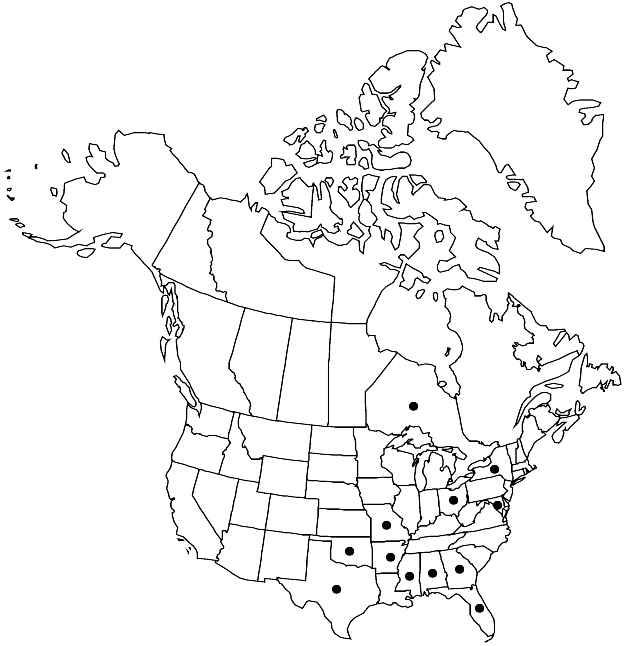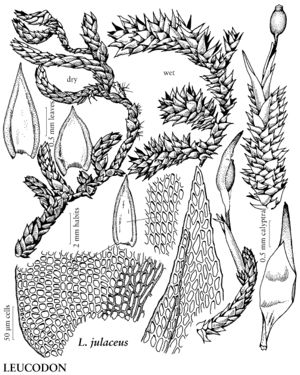Leucodon julaceus
Musc. Allegh., 87. 1846.
Plants medium-sized, somewhat glossy. Stems short or rarely elongate, curved, rarely straight and rigidly spreading, julaceous, fragile branchlets absent from distal leaf axils. Branch leaves erect-appressed, not secund, not plicate, 1.1–1.6 mm; apex acute to short-acuminate; apical laminal cells papillose abaxially; terminal cell isodiametric, concolorous. Perigonia common. Perichaetia common. Capsule barely to long-exserted, ovoid-cylindric, symmetric, 1.5 mm. Spores 33–40 µm.
Phenology: Capsules mature Oct–Jun.
Habitat: Tree trunks, logs, rock, soil
Elevation: low to moderate elevations (0-1500 m)
Distribution

Ont., Ala., Ark., Fla., Ga., Md., Miss., Mo., N.Y., Ohio, Okla., Tex., Mexico (Nuevo León, Querétaro, San Luis Potosí, Tamaulipas, Veracruz), West Indies (Hispaniola).
Discussion
Leucodon julaceus is common and widespread in much of the eastern portion of the flora area. The usually short, curved, julaceous branches, non-plicate leaves, and somewhat glossy aspect are characteristic. Plants of L. julaceus with slender, elongate rhizomelike primary stems bearing widely spaced, short, uncinate branches are very different in appearance from more robust plants with inconspicuous primary stems bearing straight, elongate, crowded branches. The plants with elongate stems sometimes form extensive soft, tangled mats and may be mistaken for mosses of other families. In L. andrewsianus and L. brachypus, the leaves are longer and more or less plicate; L. julaceus lacks the clustered fragile branchlets of L. andrewsianus. Capsules of L. julaceus are usually exserted beyond the perichaetial leaves; those of L. brachypus are partially immersed. The calyptra of L. julaceus splits along one side and may remain clasping the seta below the capsule for a time; it sometimes grips the tip of the operculum and, when dry, lifts the operculum to open the capsule, as in Calymperes (Calymperaceae). Most or all of the spores may escape, leaving empty capsules still enclosed by the calyptra, with the calyptra still gripping the operculum.
Selected References
None.
